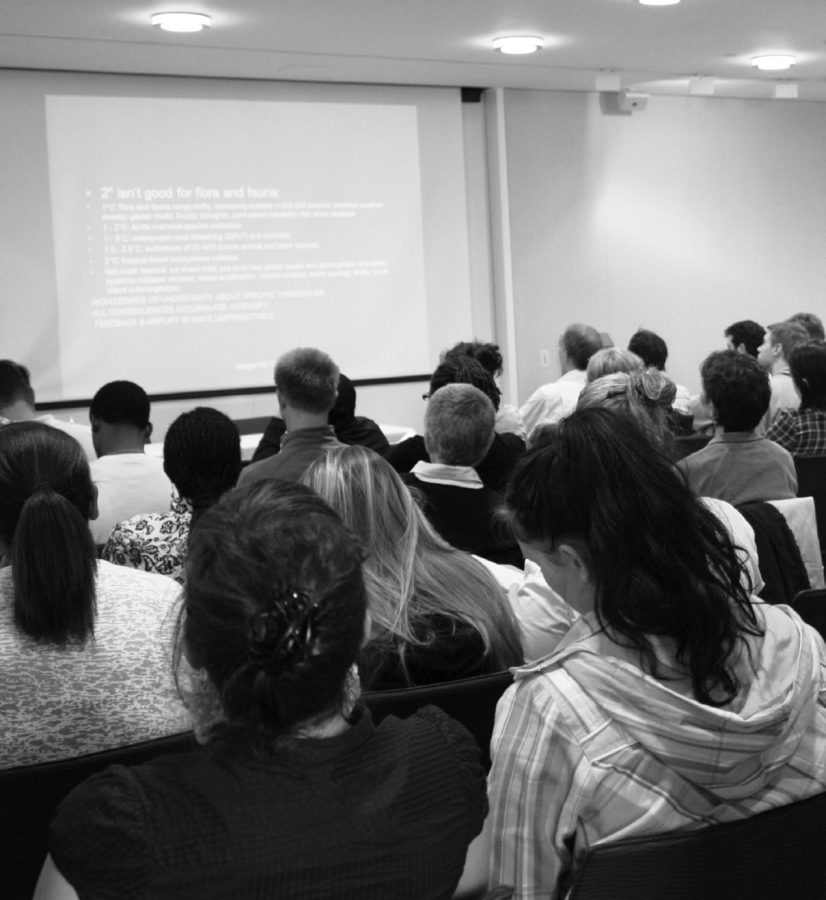Climate change is a puzzle in ur¬gent need of a solution. Joni Seager, Professor and Chair of Global Studies at Bentley University, says that without gender analysis, a crucial piece is miss¬ing. Seager outlined a gendered ap¬proach to climate change at the UMB Campus Center on September 16th in her lecture entitled Really Inconve¬nient Truths: Gender, Climate Change and Environmental Security. The lec¬ture was the first of four in UMass Bos¬ton’s Consortium on Gender, Security and Human Rights Fall 2010 Speaker Series. Seager has done work on gender and the environment in Mongolia and Mozambique, and has been a consul¬tant to a group of the UN Division of Economic & Social Affairs since 2008. She has authored 10 books and mthan 3 dozen other publications, in¬cluding the Penguin Atlas of Women in the World, which is currently a re¬quired text for the UMB course Wom¬en in Global Perspectives. The lecture drew a crowd of over 70 people, including UMB students, faculty, and professionals. At least one third of the audience was students, several of whom attended as part of as¬signments for the UMB courses Wom¬en in Global Perspectives and Seminar in International Relations. The post-lecture discussion was lively, and Sea¬ger’s point of view raised both praise and debate from students, faculty and professionals alike. “We should have something like this every month. Students need to know,” said International Relations student Koeje Agblekpe after the event. Hassane Camara, another Inter¬national Relations student, remarked that for him, the gender issue “hit home”. “It made me realize there are some things I need to research,” said one African Women’s Studies student. Seager contested the “two degree target” often used in climate change analysis, which states that a global two degree temperature increase is tolerable. “Why two degrees? Why so precise?” she asked. Seager outlined the dire consequences of a two degree increase: rises in malaria, water short¬ages, decreased crop production, and millions of human deaths. “The com¬placency of two degrees is based on the confidence that impacts will fall earli¬est and heaviest on Africa, low lati¬tudes, tropics, small islands, the arctic, and women,” she explained. “Why not above two degrees?” she asked. Sea¬ger reported that above a 2 degree in¬crease, the entire globe will be affected rather than specific regions. “It’s when ‘them’ becomes ‘us’,” she stated. Drawing on her work in Mozam¬bique and Mongolia, Seager urged for climate change analysis to “start with people”. “[The 2 degree target] sets a tolerance for human caused deaths,” said Seager. She brought a human face to the grim reality of climate change with photos of local people she had met during her work overseas. “If cli¬mate change continues, these people will die,” she stated. Seager urged for people to use the small scale and consider the reality of gender roles when helping people adapt to climate change. In Africa, a suggested adaptation method for water shortages is to use four-legged animals to help carry water long dis¬tances, said Seager. In Mozambique, women are responsible for getting wa¬ter, however custom dictates that they are not allowed to be in charge of four-legged animals, so it is not a real solu¬tion for them. Seager also warned that we must not fall into the trap of treating gen¬der as insignificant when including it in policy making. “Gender analysis won’t save the planet, but I don’t think we can save the planet without it,” she concluded. For more news and events related to UMB’s Consortium on Gender, Se¬curity and Human Rights and the Fall 2010 Speaker Series, visit www.disres. umb.edu ore
Latest Stories
- Environmental leaders spark change at the Community Action Works Summit
- Massachusetts partners with local nonprofit to support Summer Eats program
- Day Three: Chappell Roan, Hozier, and The Killers bring Boston Calling to a Spectacular Finish
- Boston Calling Day Two: Jessie Murph, The Red Clay Strays, and Tyler Childers Light Up the Stage
- Boston Calling Day One: Luke Hemmings, David Kushner, Renee Rapp, and Ed Sheeran.
- Semester reflections: A mix of emotions in the journey of higher education
- Celebrate AANHPI Heritage Month with these must-read books
- Liberation through tradition: Passover in a time of genocide
- Karla Corres Luna wins a Fulbright Award
- Get creative with the UMass Boston Art Club
66°





















































